GERMANY ENERGY CHANGES
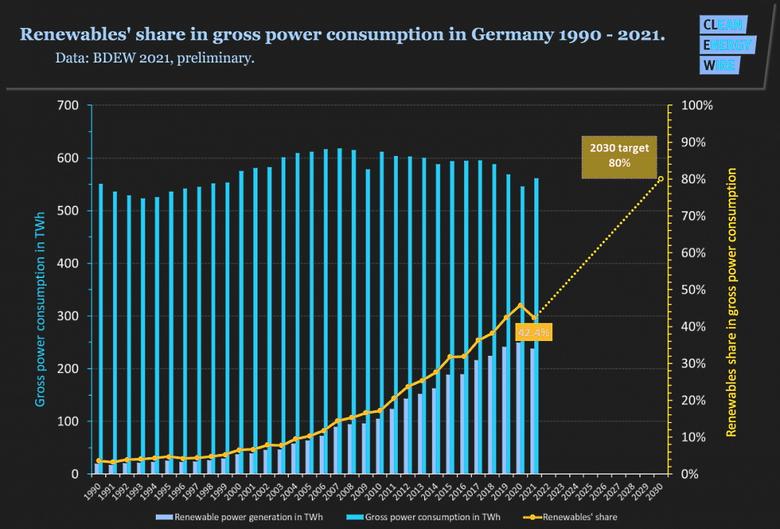
РЕЙТЕР -
-----
Раньше:

2018, March, 14, 11:45:00
REUTERS - U.S. West Texas Intermediate (WTI) crude futures CLc1 were at $60.77 a barrel at 0753 GMT, up 6 cents, or 0.1 percent, from their previous settlement. Brent crude futures LCOc1 were at $64.62 per barrel, down just 2 cents from their last close.
|

2018, March, 7, 15:00:00
РЕЙТЕР - К 9.17 МСК фьючерсы на североморскую смесь Brent опустились на 0,85 процента до $65,23 за баррель. Фьючерсные контракты на американскую лёгкую нефть WTI к этому времени торговались у отметки $62,07 за баррель, что на 0,85 процента ниже предыдущего закрытия.
|

2018, March, 7, 14:00:00
EIA - North Sea Brent crude oil spot prices averaged $65 per barrel (b) in February, a decrease of $4/b from the January level and the first month-over-month average decrease since June 2017. EIA forecasts Brent spot prices will average about $62/b in both 2018 and 2019 compared with an average of $54/b in 2017.
|

2018, March, 5, 11:35:00
РЕЙТЕР - К 9.28 МСК фьючерсы на североморскую смесь Brent поднялись на 0,33 процента до $64,58 за баррель. Фьючерсные контракты на американскую лёгкую нефть WTI к этому времени торговались у отметки $61,44 за баррель, что на 0,31 процента выше предыдущего закрытия.
|

2018, March, 4, 11:30:00
МИНФИН РОССИИ - Средняя цена нефти марки Urals по итогам января – февраля 2018 года составила $ 65,99 за баррель.
|

2018, February, 27, 14:15:00
РЕЙТЕР - К 9.18 МСК фьючерсы на североморскую смесь Brent опустились на 0,15 процента до $67,40 за баррель. Фьючерсные контракты на американскую лёгкую нефть WTI к этому времени торговались у отметки $63,80 за баррель, что на 0,17 процента ниже предыдущего закрытия.
|

2018, February, 27, 14:05:00
МИНФИН РОССИИ - Средняя цена на нефть Urals за период мониторинга с 15 января по 14 февраля 2018 года составила $66,26457 за баррель, или $483,7 за тонну.
|
GERMANY ENERGY CHANGES

ENERDATA - 1 Mar 2022 - The German Federal Ministry of Economic Affairs and Climate Action has proposed higher renewable capacity targets to make the country's power supply almost 100% renewable by 2035. Germany currently targets full renewable supply before 2050. The Renewable Energy Act (EEG) will be amended to reach up to 110 GW of onshore wind capacity by 2030, 30 GW of offshore wind and 200 GW of solar PV capacity, and tender volumes under the EEG will be adjusted to meet the higher targets. Auctions would be maintained but community-led projects would be exempted from the tendering process, and ground-mounted solar projects would gradually enter into a Contract for Difference (CfD) scheme. The renewable support cost should be borne by the German budget as of mid-2022, since coalition parties have just approved a €13bn package of measures to help households in a context of soaring energy prices: the EEG surcharge, levied on electricity bills to support renewables, will be abandoned as of 1 July 2022 (instead of January 2023), which should save around €150/year for an average household and cost €6.6bn to the German budget.
In addition, Germany will look into all options in response to the likely decrease or stop in Russian fossil fuel deliveries to Germany, including a longer run-time of nuclear and coal-fired power plants, even if those options are unlikely. The last remaining nuclear power plants in Germany are scheduled to be decommissioned by the end of 2022. The country has set a legal date for phasing out coal power by 2038, which could be accelerated to 2030 if possible. Moreover, Germany has relaunched plans to build two liquefied natural gas (LNG) import terminals, one in Brunsbuettel and one in Wilhelmshaven. The regasification project in Brunsbuettel is developed by a consortium of Gasunie, Oiltanking and Vopak and would have an initial capacity of 8 bcm/year. The Wilhelmshaven project, promoted by Uniper, was initially expected to have a capacity of 10 bcm/year (cancelled in early 2021).
Finally, the country will increase the volume of natural gas in its storage facilities by 2 bcm via long-term options. Germany has 24 bcm of underground caverns of gas storage. A draft law is under preparation and should oblige gas storage owners to have their storage facilities full before the start of the winter. A similar coal reserve is under consideration since Germany is 50% dependent on Russian coal imports.
-----
Earlier:
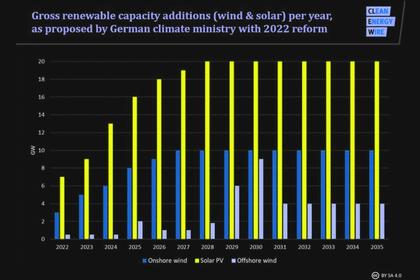
2022, March, 1, 12:10:00
GERMANY ENERGY POLICIES CHANGES
Europe's top economy has been under pressure from other Western nations to become less dependent on Russian gas, but its plans to phase out coal-fired power plants by 2030 and to shut its nuclear power plants by end-2022 have left it with few options.
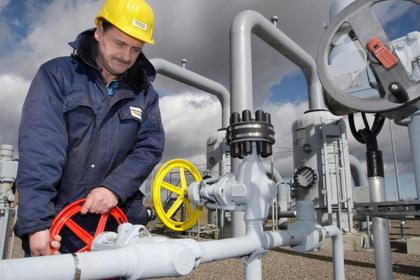
2022, February, 10, 15:15:00
GERMANY'S GAS STORAGE DROPS
Stocks were now at 35%-36%, under the "critical level" of 40%, which the German government deems is necessary to withstand seven straight days of an extreme cold snap.
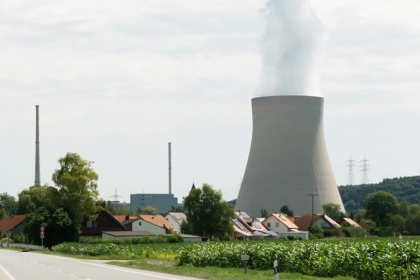
2022, January, 24, 12:15:00
GERMANY AGAINST NUCLEAR
"As the federal government, we have once again clearly expressed our rejection of the inclusion of nuclear energy. It is risky and expensive," Vice Chancellor and Economy Minister Robert Habeck said in a joint statement with Environment Minister Steffi Lemke, both senior members of the Greens party.
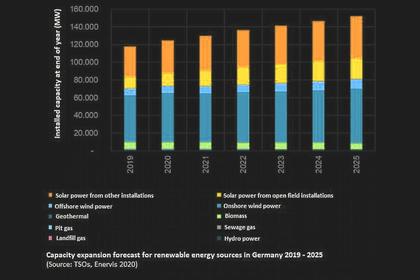
2022, January, 13, 14:10:00
GERMANY RENEWABLES DEVELOPMENT
Habeck said it was “completely indisputable” Germany will need more gas-fired power plants as a “backup” solution in case supply from renewables isn't sufficient.
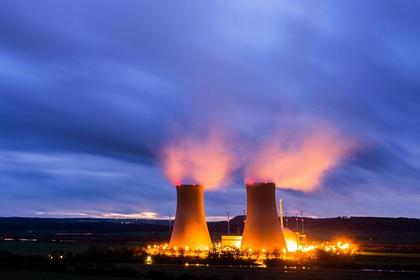
2022, January, 11, 11:55:00
GERMANY'S NUCLEAR DOWN
Germany will have just three nuclear power plants operating in 2022: Emsland (1406MW PWR) in Lower Saxony; Isar 2 (1485MW PWR) in Bavaria and Neckarwestheim 2 (1400MW PWR) in Baden-Württemberg.
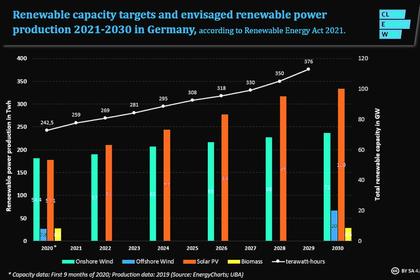
2022, January, 11, 11:35:00
GERMANY'S RENEWABLES 43% IN 2021
The share of renewables in the power mix declined from 48% in 2020 to less than 43% in 2021, with 23% of wind, 9% of solar and 11% of biomass, hydropower and other renewables.
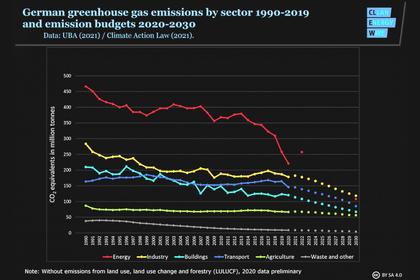
2021, December, 22, 12:05:00
GERMANY'S CO2 EMISSIONS UP
CO2 emissions from power generation thus rose by 13% in 2021, though remaining within the path of the Climate Protection Act.
All Publications »
Tags:
GERMANY,
ENERGY,
GAS,
RENEWABLES,
COAL





















